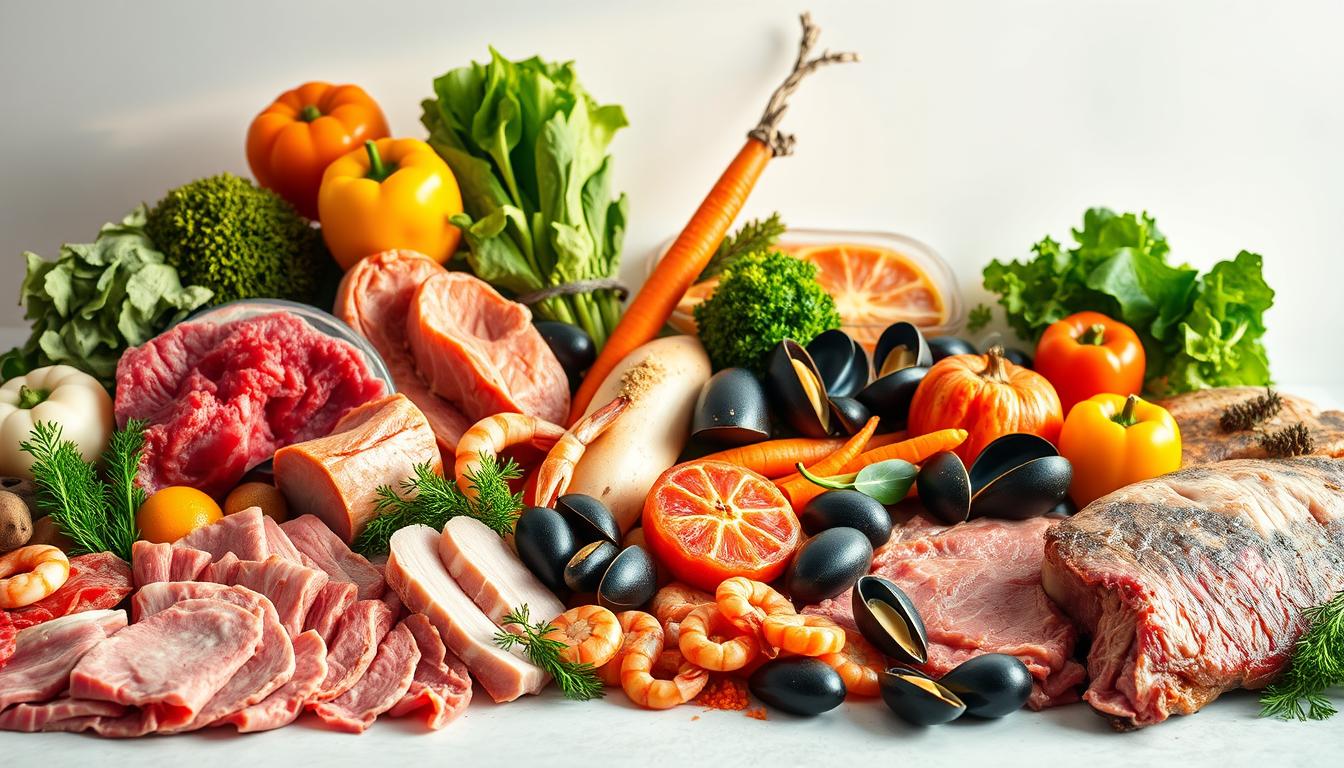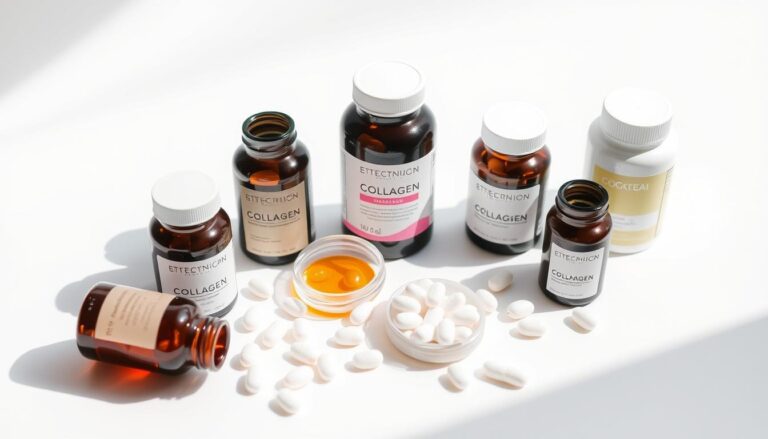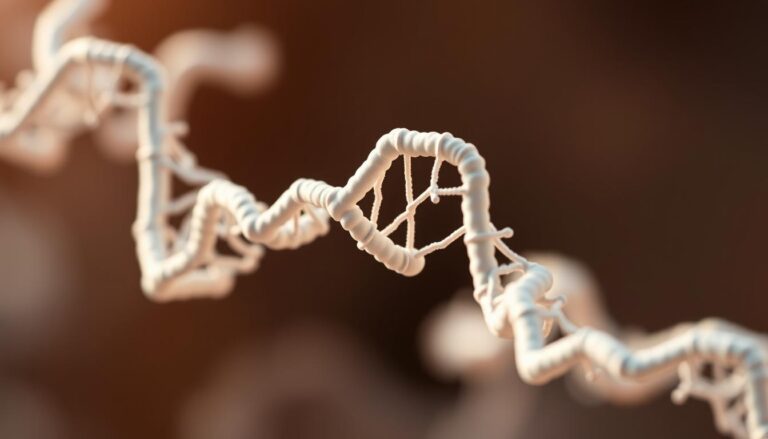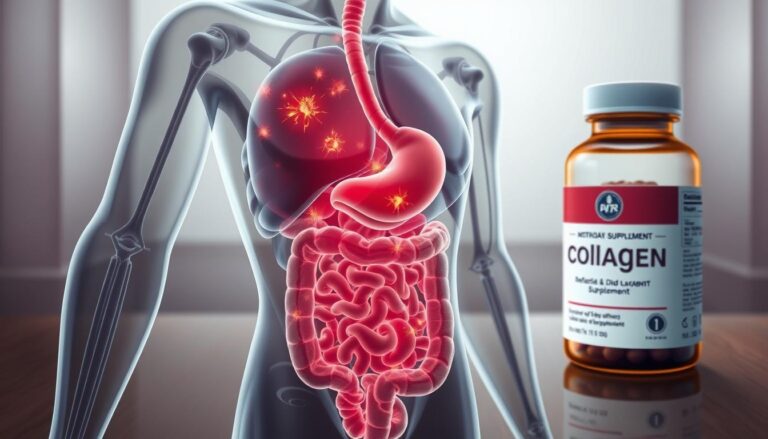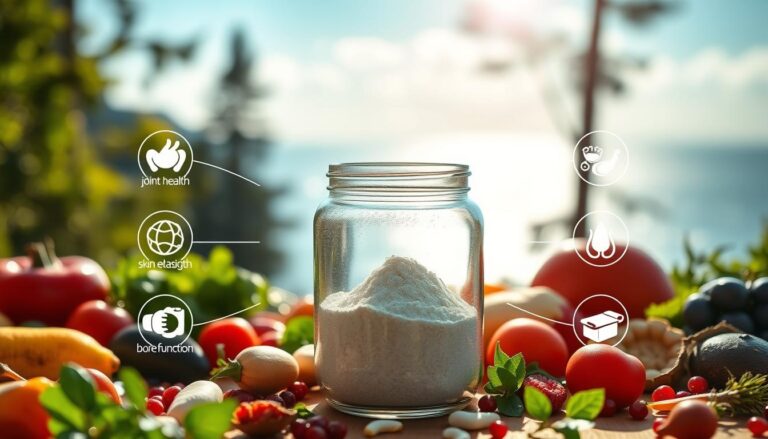What Foods Naturally Contain Collagen? A Simple Guide
Many people focus on keeping their skin healthy and young. Collagen, a key protein, is vital for our skin, bones, and connective tissue. As we get older, our bodies make less collagen, which can cause wrinkles and joint problems.
Eating foods that boost collagen can help. Foods like chicken are good sources of collagen. Berries, full of antioxidants, can also help make more collagen.
Knowing which foods have collagen can help you make better food choices. This can improve your skin’s elasticity and overall health.
Table of Contents
Understanding Collagen and Its Importance
Collagen is more than just a protein. It’s essential for your skin, bones, and joints. It’s the most common protein in your body, keeping tissues like skin, bones, and tendons strong.
What Is Collagen and Why Do You Need It?
Collagen is a protein made of amino acids like glycine and proline. It gives your skin, bones, and tissues strength and flexibility. As you get older, your body makes less collagen, causing wrinkles and joint pain.
The Role of Collagen in Skin, Hair, and Joint Health
Collagen is key for healthy skin, hair, and joints. It keeps your skin elastic and hydrated. For your hair, it adds strength and shine. In your joints, it helps keep cartilage, which makes movement smooth.
How Your Body Produces Collagen Naturally
Your body makes collagen from amino acids in proteins. Vitamin C is important for this process. It helps stabilize collagen. As you age, your collagen production goes down, but the right diet can help.
| Factor | Effect on Collagen Production |
|---|---|
| Aging | Decreases collagen production |
| Vitamin C | Supports collagen synthesis |
| Dietary Proteins | Provides necessary amino acids |
Knowing about collagen and its role can guide your diet and lifestyle choices. It supports collagen production and overall health.
Can You Get Collagen Directly From Foods?
It’s important to know how to get collagen from food for better skin, hair, and joints. While supplements are out there, eating collagen-rich foods is a natural way to do it.
The Difference Between Consuming Collagen and Producing It
Eating collagen from food gives your body the protein it needs for health. But making collagen involves different nutrients and vitamins your body uses.
Foods rich in collagen, like bone broth, have collagen your body can use right away. Making collagen, though, needs nutrients like vitamin C, proline, and glycine found in many foods.
Bioavailability of Collagen in Different Food Sources
The way collagen is absorbed from food varies. Bone broth, for example, is very easy for your body to absorb because it’s full of hydrolyzed collagen.
Why Diet Matters for Collagen Production
Your diet is key to making collagen. Eating collagen-boosting foods and nutrients helps your body make more collagen. Foods full of antioxidants, vitamins, and minerals are especially good.
Eating the best foods for collagen production helps meet your body’s collagen needs. This supports your overall health.
Animal-Based Foods That Naturally Contain Collagen
Animal-based foods are packed with collagen, helping improve your skin, hair, and joints. They give your body the collagen it needs and offer many other nutrients.
Bone Broth: The Ultimate Collagen Powerhouse
Bone broth is famous for its collagen, making it great for boosting collagen levels. It’s made by slow-cooking animal bones, which extracts collagen. This results in a food that’s full of nutrients and easy to digest.
Fish and Shellfish Collagen Sources
Fish and shellfish are tasty and full of collagen. Fish scales and skin are especially rich in collagen, even though they’re often thrown away. Oysters and mussels also have collagen, mainly in their membranes.
Chicken and Other Poultry
Chicken, especially its cartilage, is a natural collagen source. Eating chicken or using chicken broth can help increase your collagen intake.
Beef and Pork Collagen-Rich Cuts
Beef, especially from the hide and bones, is rich in collagen. Pork also has collagen, especially in its skin and bones. Eating these foods or making broth from them can greatly increase your collagen levels.
Some key animal-based foods that are rich in collagen include:
- Bone broth
- Fish and shellfish
- Chicken and other poultry
- Beef and pork
Adding these foods to your diet can naturally support your body’s collagen production. This can lead to many health benefits.
What Foods Have Collagen From Marine Sources?
The ocean is full of foods rich in collagen. Marine collagen, especially Type I, is great for skin, hair, and joints. It’s very effective and easy for our bodies to use.
Fish Skin and Scales: Overlooked Collagen Sources
Fish skin and scales are packed with collagen. Eating these parts, often thrown away, can really help your health. Salmon and cod are top choices.
Shellfish Membranes and Their Collagen Benefits
Shellfish membranes are also a good source of collagen. They have glycosaminoglycans, which are good for joints and skin.
Wild-Caught vs. Farm-Raised Fish for Collagen
Wild-caught fish have better fats and more collagen. This is because they eat naturally. Farm-raised fish can also be good if raised right.
How to Prepare Fish to Maximize Collagen Intake
To get more collagen from fish, slow cook it. Making soups and stews is best. It pulls collagen from bones and skin, making it easier for us to use.
| Marine Source | Collagen Type | Health Benefits |
|---|---|---|
| Fish Skin | Type I Collagen | Improves skin elasticity and hydration |
| Shellfish Membranes | Type II Collagen | Supports joint health |
Unexpected Animal Foods High in Collagen
Some animal foods are packed with collagen, surprising many. While we know about collagen in bone broth and gelatin, other foods also offer a lot. These foods can help increase your collagen intake.
Organ Meats: Nature’s Collagen Concentrate
Organ meats are full of collagen, especially Type I. Liver and kidney are not just collagen-rich but also full of other nutrients. Adding these to your diet can naturally boost your collagen levels.
Egg Whites and Membranes: Hidden Collagen Boosters
Egg whites are a great source of proline, key for making collagen. The membranes in eggs are also high in collagen. Using whole eggs, including the membranes, helps your body make more collagen.
Gelatin-Based Foods and Their Collagen Content
Gelatin-based foods, like homemade jellies and desserts, are full of collagen. These foods come from breaking down collagen-rich animal products. This makes the collagen easier for your body to use.
Dairy Products That Support Collagen Production
Some dairy products help make collagen. For example, milk and yogurt have amino acids and other nutrients. These can help increase your collagen levels.
Plant-Based Foods That Boost Collagen Production
Eating foods rich in certain nutrients can help your body make more collagen. Even though plants don’t have collagen, they can give your body what it needs to make it. This is key for keeping your skin, hair, and joints healthy.
Vitamin C-Rich Fruits and Vegetables for Collagen Synthesis
Vitamin C is very important for making collagen. It helps the enzymes that build and connect collagen molecules. You can find lots of vitamin C in citrus fruits, berries, and leafy greens.
Proline-Rich Plant Foods Your Body Needs
Proline is an amino acid that your body needs for collagen. While it’s found more in animal products, some plants like mushrooms, asparagus, and cabbage have it too.
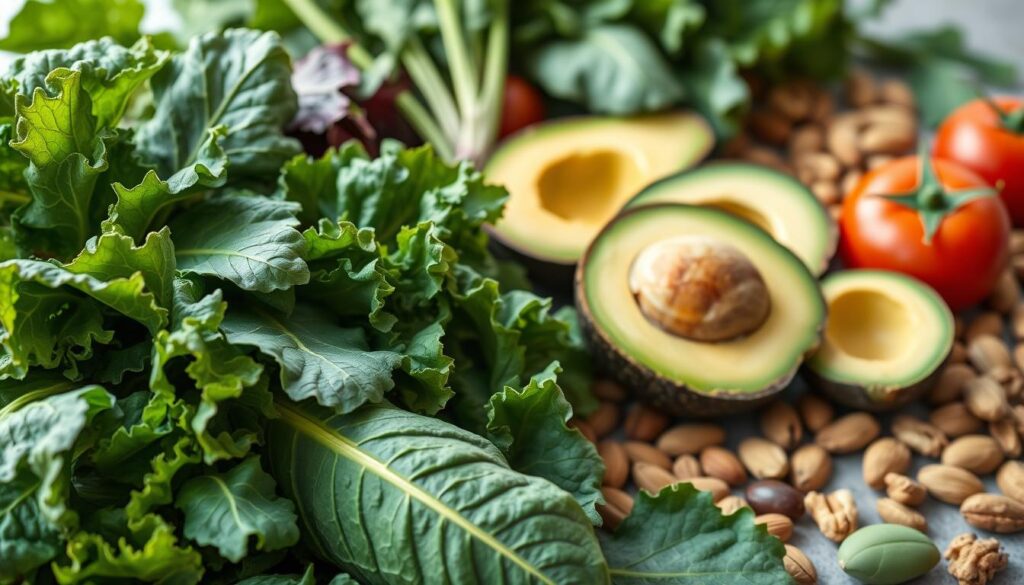
Glycine Sources for Vegetarians and Vegans
Glycine is another amino acid your body needs for collagen. You can get glycine from plants like spinach, kale, beans, and legumes. Eating these foods can help your body make more collagen.
Antioxidant-Rich Foods That Protect Existing Collagen
Antioxidants help keep collagen safe from damage. Foods full of antioxidants include berries, leafy greens, and other fruits and vegetables. Eating these can help keep your collagen healthy.
Soy Products and Their Effect on Collagen
Soy products like tofu and tempeh have isoflavones that might help make more collagen. While the science is still out, adding soy to your diet could have many health benefits, including helping your collagen.
| Nutrient | Food Sources | Benefit for Collagen |
|---|---|---|
| Vitamin C | Citrus fruits, berries, leafy greens | Essential for collagen synthesis |
| Proline | Mushrooms, asparagus, cabbage | Important amino acid for collagen |
| Glycine | Spinach, kale, beans, legumes | Critical for collagen production |
| Antioxidants | Berries, leafy greens, other fruits and vegetables | Protects collagen from damage |
Collagen-Boosting Herbs and Spices
Some herbs and spices can help boost collagen. Adding them to your meals is a simple way to improve your collagen health.
Herbs That Support Collagen Synthesis
Rosemary and thyme are full of antioxidants. These protect collagen from harm. Turmeric has curcumin, which fights inflammation and helps make collagen.
Spices With Collagen-Protective Properties
Garlic is rich in sulfur, key for collagen making and keeping it intact. Cinnamon and ginger also protect collagen with their anti-inflammatory effects.
| Herb/Spice | Benefit for Collagen |
|---|---|
| Rosemary | Antioxidant properties protect collagen |
| Garlic | High in sulfur, supports collagen production |
| Turmeric | Anti-inflammatory properties support collagen synthesis |
How to Incorporate Collagen-Boosting Herbs Into Daily Meals
It’s easy to add these herbs to your meals. Sprinkle rosemary on roasted veggies or thyme on soups. Use garlic in cooking or turmeric in smoothies.
Traditional Herbal Remedies for Skin and Joint Health
Herbs like aloe vera and comfrey are used for skin health. They can be applied topically or made into teas for skin and joint support.
Cooking Methods That Preserve Collagen in Foods
To get the most collagen from food, knowing the best cooking methods is key. Collagen is important for skin, hair, and joints. It’s found in many foods, but cooking can change its amount.
Slow Cooking: The Best Method for Extracting Collagen
Slow cooking is great for getting collagen from bones and tough meat. It cooks food on low heat for hours. This gentle heat turns collagen into gelatin, making it easy to digest and full of nutrients.
Pressure Cooking Collagen-Rich Foods for Efficiency
Pressure cooking is quick and good for collagen-rich foods. It seals food in a vessel and heats it fast. This is perfect for tough meat and bones, as it quickly breaks down collagen.
Methods to Avoid When Preparing Collagen-Rich Foods
Some cooking methods can harm collagen in foods. High-heat methods like grilling or frying can ruin collagen. Also, overcooking or high temperatures can break down collagen.
Storage Tips for Preserving Collagen Content
Storing collagen-rich foods right is important. Keep them in airtight containers to keep moisture and contaminants out. Refrigeration or freezing can also help keep them fresh longer.
| Cooking Method | Effect on Collagen |
|---|---|
| Slow Cooking | Breaks down collagen into gelatin, making it easily digestible |
| Pressure Cooking | Quickly breaks down collagen, efficient for tougher cuts |
| Grilling/Frying | Can denature collagen, reducing its effectiveness |
| Boiling | Can extract collagen if done slowly, otherwise may lose collagen in broth |
Creating a Collagen-Rich Diet Plan
To boost your collagen intake, it’s key to have a diet plan with collagen-rich foods. This diet supports your skin, hair, and joints. It’s a great way to improve your overall health.
Daily Meal Ideas for Optimal Collagen Intake
Adding collagen-rich foods to your meals is easy. Begin with bone broth or a collagen-rich smoothie for breakfast. For lunch, try chicken or fish soup, which are both comforting and full of collagen.
Here are some meal ideas:
- Breakfast: Scrambled eggs with spinach and mushrooms
- Lunch: Grilled chicken with roasted vegetables
- Dinner: Slow-cooked beef stew with carrots and potatoes
Combining Foods for Maximum Collagen Benefits
Mixing foods high in collagen with those that boost collagen production is smart. Eating vitamin C-rich foods like citrus fruits or berries with collagen-rich foods helps make more collagen.
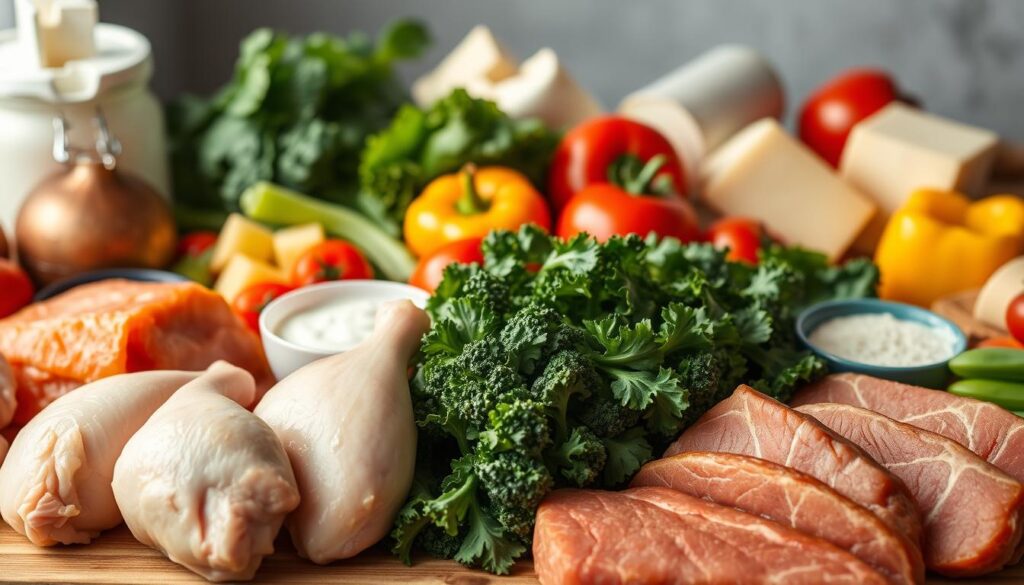
Sample Weekly Menu for Collagen Support
Here’s a weekly menu to help you start:
| Day | Breakfast | Lunch | Dinner |
|---|---|---|---|
| Monday | Bone broth | Grilled chicken salad | Beef stew |
| Tuesday | Collagen-rich smoothie | Chicken soup | Baked salmon |
Adjusting Your Diet Based on Specific Health Goals
Adjust your diet based on your health goals. For better skin, add foods high in antioxidants and vitamin C. A balanced diet with whole foods is key for collagen production, says an expert.
“A well-balanced diet that includes a variety of whole foods can provide the necessary building blocks for optimal collagen production.”
Customize your diet to meet your needs and include best foods for collagen production. This way, you’ll get the most from a collagen-rich diet.
Common Myths About Collagen in Foods
Collagen is getting more popular, but it’s important to know the truth about it in foods. Many people look to food for collagen, but myths surround its effectiveness and availability.
Debunking Collagen Supplement vs. Food Claims
Some think collagen supplements work better than food. But studies show eating collagen-rich foods can be just as good. Foods like bone broth and gelatin give your body the amino acids it needs to make collagen.
The Truth About “Collagen-Infused” Products
“Collagen-infused” products are often misunderstood. They claim to boost collagen, but their benefits are often overstated. The truth is, the body might not absorb the collagen in these products well.
Scientific Evidence on Dietary Collagen Effectiveness
Research shows that eating collagen can make your skin and joints healthier. But we need more studies to know all its benefits.
Realistic Expectations for Diet-Based Collagen Benefits
It’s important to have realistic hopes when adding collagen-rich foods to your diet. While they can help your health, they’re not a quick fix. A balanced diet and a healthy lifestyle are essential to get the most out of them.
Special Considerations for Different Age Groups and Health Conditions
Your collagen needs change with age, health, and lifestyle. As you get older, your body makes less collagen. Eating the right foods is key.
Collagen Needs in Your 20s, 30s, and Beyond
In your 20s and 30s, eating foods that boost collagen is important. They help keep your skin and joints healthy. By your 40s and later, eating more collagen-rich foods is crucial to fight aging.
Supporting Collagen Production During Pregnancy
When you’re pregnant, eat foods full of nutrients that help make collagen. This is good for you and your baby.
Dietary Strategies for Seniors with Declining Collagen
Seniors should eat foods with antioxidants and collagen. This helps fight aging effects.
Collagen-Rich Foods for Athletes and Active Individuals
Athletes should eat foods rich in collagen. This helps their joints and aids in recovery.
Allergies and Sensitivities to Consider
Be careful with collagen-rich foods, especially if you’re allergic to fish or eggs. Watch out for any sensitivities.
Conclusion: Incorporating Collagen-Rich Foods Into Your Lifestyle
Adding collagen-rich foods to your diet is easy and can help your skin, hair, and joints. Knowing which foods are high in collagen helps you make better choices. This boosts your body’s collagen production naturally.
There are many collagen-rich foods out there, from animal sources like bone broth and fish to plant-based options. Start by adding foods rich in vitamin C, proline, and glycine to your meals. These are key for making collagen.
Making a few diet changes can greatly improve your health. Whether you want better skin, less joint pain, or healthier hair, collagen-rich foods can help. Start today and see the positive effects on your overall health.
